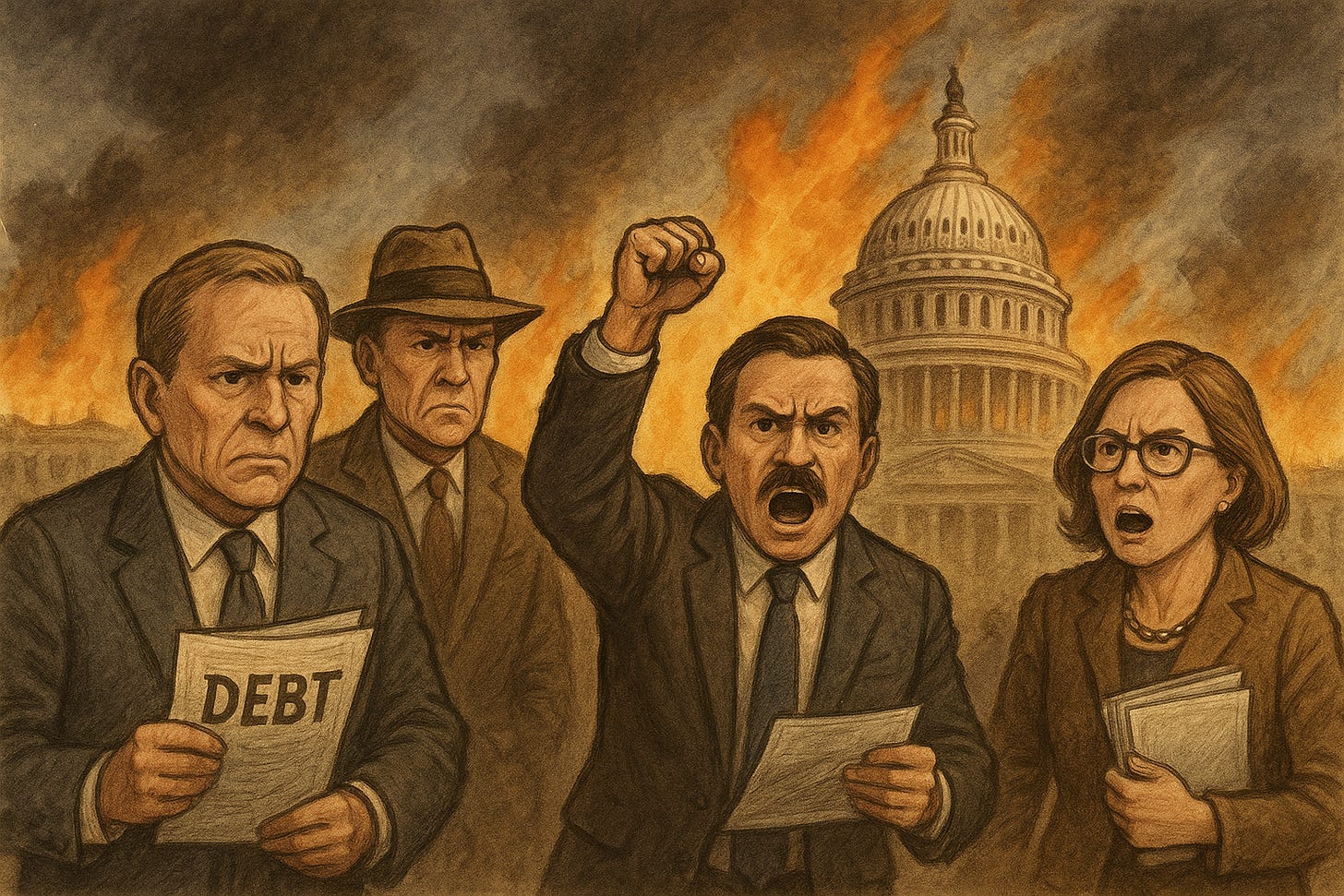It May Take a Crisis
Stein's law says nothing about *how* unsustainable things must end.
I have been a studious observer of U.S. federal government spending for over three decades. During the same span I've heard, once believed as a true believer would, and been repeatedly burned by sideshows that promise restraint but deliver only more of the same. The Republican rhetoric about smaller, simpler, saner government long ago stopped working on me. Sadly, it still works on too many.
The latest gimmickry has been a combination of waste, fraud, and abuse™ purges for show via DOGE along with culture war rounding errors. This is not to say that WF&A doesn't exist in spades across the government budget—see here, here, and here. It is just that the DOGE experiment, like so many before it, was just more political posturing than it was substantive WF&A identification. And this identification stopped well short of meaningful spending reductions. Of course the NEA, et al. shouldn't be funded by taxpayers. But as is obvious to anyone with an elementary education, doing away with this spending doesn't amount to anything budgetarily.
At the same time Democratic rhetoric and magical thinking also never ceases to be politically effective while a fiscal failure. The Democrats are at least somewhat honest that they want big government with big funding (taxes). Of course, they think only "the rich" are required to pay for all they dream of. It doesn't at all add up, but at least it is a plan. Regardless, the Democrats aren’t in charge and cannot be blamed for where we stand today in terms of policy proposals. That falls to Republicans who control the presidency and both houses of Congress.
The Republicans have their own magical thinking that more spending (only the good stuff; wink, wink) along with lower taxes can somehow lead to solvency. All of which leaves us with . . .
. . . The One Big Beautiful Bill. Quite simply it is a budget buster posing fiscal disaster. One would hope that it would have been better given all the pre and post-election rhetoric not to mention it taking so long (the longest time in decades perhaps) for a budget proposal.
The House has passed it and the Senate has yet to take it up as of this writing. Perhaps the Senate will bring some improvements, but their own initial proposals were actually worse than the House version.
The Tax Foundation estimates using the conventional method that the House version will add on net $2.6 trillion to the debt over the coming decade. That is including the spending “reductions” that are generally just reductions in the projected growth of spending (remember when Republicans rebuked 1990s Democrats for that very thing?).
Under dynamic analysis which attempts to fully account for positive growth effects, the BBB still results in a net $1.7 trillion debt increase.
And it didn’t include codifying any of DOGE’s underwhelming savings promises (a measly $15 billion?) into law—meaning there is little hope they will come to fruition.
The market reaction has been quite sour. The recent increases in U.S. Treasury yields combined with a steady decline in the U.S. Dollar bode very ominous. Even without the latest credit downgrade (this time from Moody's who is late to the party that S&P and Fitch arrived at year's ago), the market is well ahead of the curve pricing in impending trouble.
These recent trends come against a backdrop of a steady, long-running decline in the U.S. Dollar’s share of foreign exchange.
All of this is just a small cough coming out of the canary. He hasn't yet died, but if he did, I'm not sure anyone would notice. We just keep plugging along chipping into the coal (spending more and taxing less) at reckless speeds.
I fear the only way this can be reconciled is a come-to-Jesus moment. No other strategy can work. Starve the beast was a workable plan in theory, but it relied on people caring about debt and deficits. It is clear that the general populace cannot be bothered to understand the problem—at least in the sense that they cannot connect the dots between the problems with debt in general and the specifics on what must be cut.
Alternatively, tax the hordes might work, but no one is seriously contemplating it. Again, the median voter thinks they should pay less in taxes while consuming the same or more government services. The disconnect is astonishing until you start talking to the general voter. At that point you realize it is just sad.
So we're stuck in a debt death spiral until the funders finally cry foul once and for all. This may not arrive until we've passed a point of financially dreadful setback which likely includes a Social Security system that is forced to take shocking cuts along with a Medicare payments brick wall.
The bond vigilantes will have their day. And they will be our only hope. If they show up in time, we can be forced to make what will still be very painful fiscal decisions but ones that would avert catastrophe. Without their forced discipline coming soon enough, we will eventually endure the full brunt of bankruptcy.
Here’s hoping Stein’s Law implies a happy ending.



